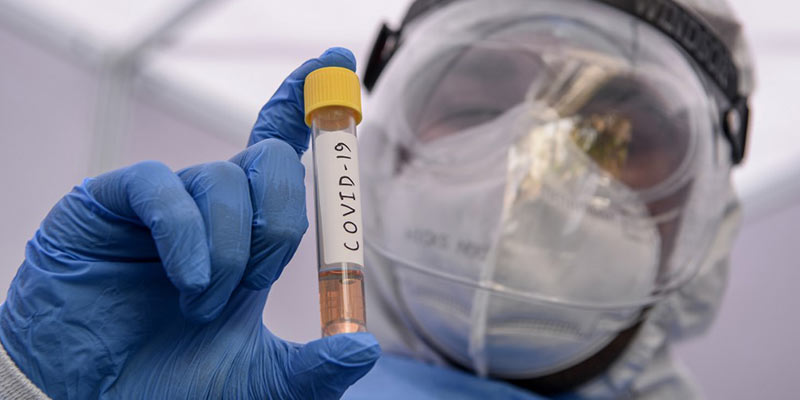- India
- May 11
NIV develops COVID KAVACH ELISA
The National Institute of Virology (NIV) in Pune has successfully developed the first indigenous antibody detection kit for COVID-19 that will play a critical role in surveillance for coronavirus infection, Union Health Minister Harsh Vardhan said.
The serological test will detect the Immunoglobulin G (IgG) antibody, and will be used for surveillance purposes in hotspots.
“The Indian Council of Medical Research (ICMR)-National Institute of Virology (NIV) in Pune has developed and validated the indigenous IgG ELISA test COVID KAVACH ELISA for antibody detection for COVID-19,” an official statement said.
Experts say that there are two types of antibodies – ImmunoglobinG (IgG) and Immunoglobulin M (IgM).
IgM antibodies may be detected somewhere between seven to eight days after SARS-CoV-2 infection, and IgG may be detected after two weeks or so.
IgG antibody develops during the late phase of infection, and remains in the body even after the patient has recovered from SARS-CoV2. So, if a person tests positive for SARS-CoV-2 specific IgG antibodies, then it means that the person had the infection, but they recovered.
Significance of the new test kit
Most countries in the world are struggling to contain the pandemic using possible interventions. There is an augmented demand of various types of diagnostic tests by countries all across the globe.
Most of the diagnostic material for COVID-19 is imported into India from other countries. The ICMR recently cancelled orders for about half a million COVID-19 rapid antibody test kits from China after they were found to be giving out inaccurate results.
Indian scientists are tirelessly engaged in developing indigenous diagnostics for SARS-CoV-2, the causative agent of COVID19.
The NIV’s competent scientific team successfully isolated the SARS-CoV-2 virus from laboratory confirmed patients in India. This in turn, has paved the way for development of indigenous diagnostics for SARS-CoV-2.
While real time RT-PCR is the frontline test for clinical diagnosis of SARS-CoV-2, robust antibody tests are critical for surveillance to understand the proportion of population exposed to infection.
The scientists at ICMR-NIV, Pune, have enthusiastically worked to develop and validate the completely indigenous IgG ELISA test for antibody detection for SARS-CoV-2.
The testing technique is used to detect antibodies in the blood of people who may have had coronavirus infection.
There are also minimal biosafety and biosecurity requirements for the test as compared to the real-time RT-PCR test.
The test also has an advantage of having much higher sensitivity and specificity as compared to the several rapid test kits which have recently flooded the Indian market.
Features of COVID KAVACH ELISA
Developed in a month’s time, the testing kit would help to study the presence of anti-SARS-CoV-2 IgG antibodies in the Indian population.
It is cost-effective, sensitive, rapid and a large number of samples can be tested at any level of clinical setting, public health centers and hospitals.
The test kit has the advantage of testing 90 samples together in a single run of 2.5 hours, so that healthcare professionals can proceed quickly with necessary next steps.
This kit was validated at two sites in Mumbai and has high sensitivity and accuracy. The ELISA-based testing is easily possible even at district level.
After the development at the ICMR-NIV, Pune, the technology has been transferred for mass production to Zydus Cadila, which is an innovation driven global healthcare company.
Zydus Cadila has proactively taken up the challenge to expedite the approvals and commercial production of the ELISA test kits so that they can be made available for use at the earliest, it said, describing it as a perfect example of Make in India in record time.
National Institute of Virology
The ICMR-National Institute of Virology (NIV), Pune is the apex laboratory of the country with state-of-art infrastructure and expertise for research in virology.
It was established in Pune in 1952 as Virus Research Centre (VRC) under the auspices of the ICMR and the Rockefeller Foundation (RF), US, as part of the global programme of investigations on the arthropod-borne group of viruses.
The research activities of the Institute are coordinated by a Scientific Advisory Committee (SAC) consisting of eminent scientists.
On the recommendation of the SAC, the VRC acquired its status of national importance and was renamed as National Institute of Virology (NIV) in 1978.
Subsequently, studies on Acquired Immune Deficiency Syndrome (AIDS), Rotavirus gastroenteritis, acute haemorrhagic conjunctivitis, Rabies, Herpes simplex, Buffalo pox, Measles, and Poliomyelitis were also initiated
NIV is identified as WHO Collaborating Center for arboviruses reference and haemorrhagic fever reference and research.
Functions of NIV
* Studies on viral diseases affecting humans.
* Investigations of outbreaks, isolation and characterization of viruses.
* Providing diagnosis for viral diseases and development of indigenous diagnostic tests.
* Study of natural cycle, maintenance and spread of viruses.
* Developing models for prediction of viral epidemics.
* Developing animal models to study pathogenesis of viruses.
* Developing in vitro culture systems, including development of cell lines from mammals, arthropods and fishes.
* Studies on genetic and immunological properties of various viruses.
* Molecular epidemiology.
* Developing methods of prevention and control of viral diseases.
* Creating awareness of viral diseases.
Manorama Yearbook app is now available on Google Play Store and iOS App Store

